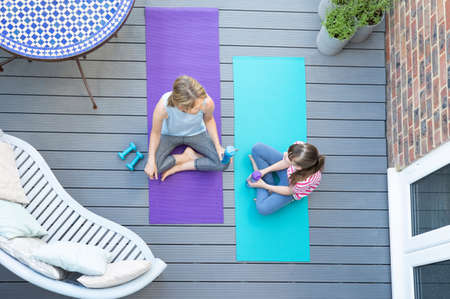Introduction: The Importance of Early Mind-Body Harmony
In the United Kingdom, where childhood and adolescent wellbeing are increasingly recognised as essential to long-term health, there is a growing appreciation for holistic approaches that nurture both mind and body from an early age. Drawing on ancient wisdom from traditions such as Chinese medicine, which emphasises the balance of qi (vital energy) and harmony between the physical and emotional self, modern British families and educators are turning to practices like yoga to foster resilience, emotional stability, and physical vitality in young people. By integrating mindful movement, breathwork, and relaxation techniques within the context of everyday life in the UK—whether in schools across London or community centres in rural Yorkshire—yoga becomes more than just exercise; it serves as a bridge connecting traditional understandings of health with contemporary scientific insights. This foundational link between early mind-body harmony and lifelong wellbeing not only echoes time-honoured beliefs but also aligns with current research highlighting the profound impact of childhood experiences on future physical and mental health. As we explore yoga’s role for children and teens in Britain, we acknowledge both the roots of these practices in ancient cultures and their relevance within today’s modern world.
2. Yoga and Children: Cultivating Emotional Balance and Physical Resilience
In modern Britain, children and teens are increasingly exposed to academic pressures, digital distractions, and social changes that can impact their emotional and physical wellbeing. Integrating yoga practices into their daily routines offers a nurturing pathway for cultivating balance—drawing upon both ancient Eastern philosophies and the pragmatic needs of UK families today. Rooted in the holistic principles of mind-body harmony, yoga for young people goes far beyond physical postures; it gently encourages emotional regulation, self-awareness, and the strengthening of natural bodily defences.
How Yoga Supports Emotional Balance
For British children, learning to manage emotions is essential for thriving at home and in school. Yoga techniques such as mindful breathing (pranayama), guided relaxation, and playful movement help children tune into their feelings without judgement. These practices allow them to recognise stress triggers, calm anxiety, and cultivate resilience—qualities valued in both traditional Chinese medicine and contemporary wellbeing frameworks.
| Yoga Practice | Emotional Benefit | Physical Benefit |
|---|---|---|
| Mindful Breathing (Pranayama) | Reduces anxiety, increases focus | Supports healthy lung function |
| Gentle Postures (Asanas) | Builds confidence, releases tension | Improves flexibility & strength |
| Guided Relaxation (Yoga Nidra) | Promotes restful sleep, eases worries | Aids recovery & immune health |
| Laughter Yoga or Playful Movement | Encourages joy & connection | Boosts circulation & energy levels |
Nurturing Physical Resilience Through Yoga
The unpredictable British weather and busy school schedules can sometimes leave children vulnerable to minor illnesses or fatigue. Yoga postures tailored for young bodies—such as gentle twists, balancing poses, and restorative stretches—help strengthen core muscles, enhance immunity, and support growth. In line with Eastern wisdom, these movements encourage the smooth flow of energy (Qi) throughout the body, while also respecting the unique developmental needs of each child.
The Role of Self-Awareness in UK Family Life
Self-awareness is a cornerstone of both yoga practice and holistic health traditions like Chinese medicine. Through mindful movement and reflection, British children develop a greater sense of how their minds and bodies respond to different situations. This awareness empowers them to make thoughtful choices—from managing screen time to seeking rest when needed—creating a foundation for lifelong wellbeing that resonates with modern UK family values.

3. Yoga for Teens: Navigating Stress, Building Confidence, and Supporting Growth
Adolescence is a transformative stage, often accompanied by a unique set of challenges for British teens. From mounting exam pressure to the struggle with self-image in the age of social media, young people in the UK are seeking holistic ways to balance their minds and bodies. Yoga, with its gentle movements and mindful breathing, offers a sanctuary where teens can cultivate resilience, confidence, and inner harmony.
Addressing Exam Stress through Mindful Practice
The academic demands faced by British teenagers can lead to significant stress and anxiety. Incorporating yoga into their daily routine provides more than just physical exercise; it encourages a state of calmness and clarity. Breathing techniques such as alternate nostril breathing (Nadi Shodhana) help regulate the nervous system, reducing feelings of overwhelm before exams or presentations. As in traditional Chinese medicine, where breath and movement are harmonised to nurture Qi (vital energy), yoga supports teens in restoring equilibrium during turbulent periods.
Building Confidence and Positive Self-Image
Body image concerns are prevalent among UK teens, intensified by societal expectations and digital influences. Yoga fosters self-acceptance by shifting the focus from external appearance to internal experience. Through postures that open the chest and strengthen the core—such as Warrior II or Mountain Pose—teens learn to embody strength and poise. This mindful approach helps them appreciate their bodies’ capabilities rather than criticising perceived flaws, supporting both emotional and physical well-being.
Supporting Holistic Growth
Beyond stress relief and confidence-building, yoga encourages holistic growth for British adolescents. The practice teaches valuable life skills: patience through holding poses, persistence when facing challenges, and compassion for oneself during setbacks. These qualities align with the integrative philosophy of Eastern traditions, where mind and body are seen as interconnected. By integrating yoga into school programmes or community activities across the UK, we nurture not only healthier individuals but also resilient communities capable of weathering life’s storms together.
4. Adapting Yoga to UK School Life: Practical Approaches and Cultural Fit
Introducing yoga into British schools calls for both sensitivity to the local culture and an understanding of the unique needs of children and teens growing up in the UK. To ensure that yoga becomes a harmonious part of school life, it is essential to integrate it with respect for the UKs multicultural environment, inclusivity policies, and traditional educational values.
Honouring Diversity and Inclusivity
Yoga programmes should be tailored to embrace all backgrounds, faiths, and abilities. By emphasising yoga as a holistic practice for mind-body balance—rather than solely a spiritual or religious activity—schools can help reassure parents and students from various cultural traditions. Offering alternatives or modifications for certain postures, using secular language, and focusing on universal benefits such as calmness, concentration, and physical wellbeing can make yoga accessible to everyone.
Practical Strategies for Integration
The following table outlines ways that schools in the UK might thoughtfully embed yoga into daily routines while respecting diversity and fostering inclusion:
| Strategy | Description |
|---|---|
| Morning Mindfulness Sessions | Short breathing or movement practices at the start of the day to set a positive tone, supporting focus and emotional balance. |
| Lunchtime Yoga Clubs | Voluntary sessions open to all ages and abilities, offering a relaxed environment for pupils to explore gentle postures and relaxation techniques. |
| Inclusive Language & Content | Avoiding culturally specific terminology; framing yoga around health, wellbeing, and stress management rather than spirituality. |
| Teacher Training & Support | Providing staff with training in trauma-sensitive and inclusive approaches, ensuring every child feels welcomed regardless of background or ability. |
| Family Engagement | Inviting parents to participate in information sessions or family yoga events, fostering community trust and understanding of yoga’s benefits. |
Respecting Traditional Values within UK Education
British educational settings often value structure, evidence-based practice, and respect for personal choice. Integrating yoga as an optional wellbeing tool—supported by research on its mental health benefits—aligns well with these principles. Schools may also link yoga activities with PSHE (Personal, Social, Health and Economic) education goals or after-school enrichment programmes. By adapting session content to reflect local customs (such as including themes relevant to British seasons or celebrations), educators can further reinforce the sense of belonging among pupils.
Through these thoughtful adaptations, yoga can become a valued aspect of school life across the UK—nurturing balance, resilience, and harmony from an early age while honouring the diverse tapestry of British society.
5. Parent and Community Engagement: Encouraging a Supportive Environment
Within the UK, the journey towards nurturing mind-body balance in children and teens is not one travelled alone. The active involvement of families and local communities forms the bedrock for sustainable holistic health. Parents, guardians, and community leaders all play a pivotal role in weaving yoga into the fabric of daily life—guiding young people to embrace mindful movement, emotional resilience, and self-awareness in a distinctly British context.
The Role of UK Families
In many UK households, parents are recognising the importance of supporting their childrens mental and physical wellbeing beyond academic achievement. By practising yoga together at home or encouraging mindful breathing before bedtime, families can foster deeper bonds and model healthy coping mechanisms. Even simple acts—like joining weekend family-friendly yoga classes or discussing emotions after school—can help cultivate an atmosphere where children feel safe to express themselves and develop inner strength.
Guidance for Parents
Parents seeking to introduce yoga to their children may start by creating small rituals: setting aside a quiet space for practice, choosing gentle postures suitable for young bodies, or exploring guided meditations with a British accent for familiarity. Open conversations about how yoga supports both body and mind can empower children to become active participants in their own wellbeing. Moreover, seeking out qualified instructors experienced with children ensures that each session respects age-appropriate needs while reflecting the values of compassion and patience central to both yoga philosophy and traditional British upbringing.
Community-Led Yoga Initiatives
Across the UK, local councils, schools, and voluntary organisations increasingly recognise yoga as a valuable tool for youth development. Community centres might host after-school yoga clubs; libraries could offer mindfulness workshops; faith groups may integrate gentle movement into their youth programmes. These initiatives not only make yoga accessible to a wider audience but also create supportive networks that reinforce positive change. When communities champion holistic practices, children benefit from a collective sense of belonging—mirroring traditional Chinese medicine’s wisdom that individual wellbeing flourishes best within harmonious surroundings.
A Shared Commitment
Ultimately, the synergy between parents and communities in the UK is essential for cultivating lasting mind-body harmony among children and teens. By embracing shared responsibility—grounded in both ancient Eastern principles and modern British values—we can gently guide the next generation towards resilience, balance, and vibrant health.
6. Conclusion: Sowing Seeds for Mind-Body Balance in the Next Generation
Introducing yoga to children and teens in the UK is much more than a trend—it is an investment in the holistic wellbeing of future generations. Drawing from ancient yogic wisdom, which aligns closely with traditional Eastern practices like Chinese medicine in viewing the mind and body as an inseparable whole, yoga offers young people the tools to build inner resilience, emotional stability, and physical harmony from an early age.
In today’s British society, where academic pressures, digital distractions, and social challenges are ever-present, nurturing balance has never been more vital. Yoga cultivates self-awareness, patience, and compassion—qualities that help young people navigate life’s ups and downs with equanimity. By weaving mindful movement, breathwork, and relaxation into daily routines, children and teens learn to listen to their bodies and manage stress before it becomes overwhelming.
The modern UK context adds a unique richness to this journey. In schools across England, Scotland, Wales and Northern Ireland, yoga is being thoughtfully integrated with mindfulness practices and PSHE (Personal, Social, Health and Economic education), reflecting a growing recognition of its benefits for mental health and classroom harmony. Community centres and local clubs also offer safe spaces for exploration and self-expression through yoga, embracing diversity and inclusivity at every turn.
Parents and educators have a crucial role in sowing these seeds. By championing yoga as both a fun activity and a profound practice for growth, they empower children to develop lifelong habits of care—for themselves and others. The wisdom of yoga reminds us that true health blossoms when body, mind, and spirit are in tune—a message that resonates deeply within Britain’s multicultural landscape.
As we look ahead, fostering mind-body balance in young people is not only about individual wellbeing but about shaping a kinder, more resilient society. The seeds planted today through early yoga practice will grow into strong roots of confidence, adaptability, and empathy—qualities that will serve the next generation well as they meet the complexities of the modern world.


